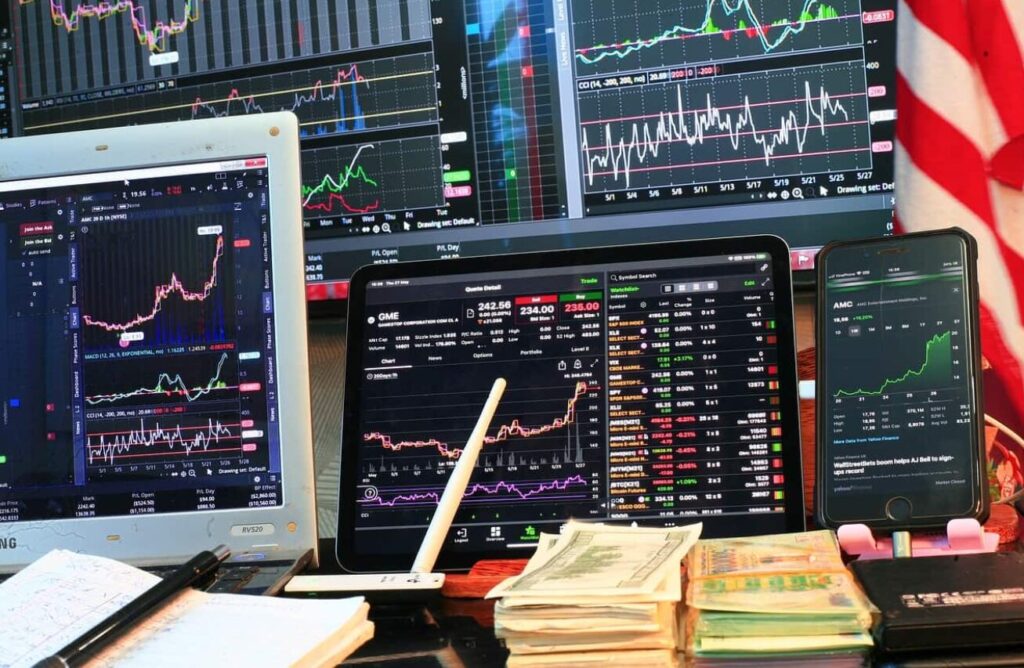There are a lot of discussions nowadays about AI trading. More than 38% of traders now use AI trading bots for investing. But before investing, you should understand how successful is AI trading. Despite showing promising potential, AI trading encounters obstacles in maintaining consistency and effective risk management in real-world scenarios. Let’s discuss more to understand the scenarios.
How Successful is AI Trading?
AI trading shows promise, but results vary. Some AI systems perform well in certain market conditions. Others struggle to adapt to rapid changes. Measuring true success remains challenging. Many firms keep their AI trading results private. This makes it hard to gauge overall effectiveness. Some reports indicate AI can outperform human traders in specific scenarios.
Besides, you must invest in a reliable trading platform to make a profit. We recommend you try the PrimeXBT. This platform allows traders to invest without needing a lot of capital. Use the promo code PRIMEOTT to get a 7% bonus on your deposit. The platform currently has over 1 million active users worldwide. To discover more features of the platform, join PrimeXBT now.
However, AI still faces limitations in understanding complex market factors. The success of AI trading often depends on the quality of data and algorithms used. Well-designed systems may yield positive results. Poorly implemented ones can lead to losses. As technology advances, AI trading strategies continue to evolve.
Experts suggest combining AI with human oversight for best results. The field of AI trading is still developing, with ongoing research and improvements.
How You Can Make AI Trading Successful?
AI trading offers several avenues for potential profit, but it’s important to understand that success is not guaranteed. Here’s how traders and investors might use AI to seek profits in financial markets:
Algorithmic Trading
AI-powered algorithms can execute trades at high speeds and volumes, capitalizing on small price movements. These algorithms analyze vast amounts of data to identify patterns and trends that humans might miss. By making rapid, data-driven decisions, AI can potentially exploit market inefficiencies before they disappear.

Traders can develop or use existing AI algorithms that employ various strategies:
- Trend-following: AI identifies and follows market trends, entering and exiting positions based on momentum.
- Mean reversion: The AI spots when prices deviate significantly from their historical average and bets on a return to the mean.
- Arbitrage: AI systems can detect price discrepancies across different markets or related securities, executing trades to profit from these differences.
AI excels at processing vast amounts of data to make predictions. This can translate to forecasting price movements and market movements.
Machine learning models can analyze historical data, news sentiment, social media trends, and other factors to predict future market behavior.
Traders can use these predictions to:
- Time their entries and exits more effectively
- Adjust their portfolio allocations based on predicted market conditions
- Identify potentially undervalued or overvalued assets
High-Frequency Trading (HFT)
While not accessible to most individual traders, institutional investors use AI for high-frequency trading. These systems execute many orders in fractions of a second, profiting from tiny price movements. AI helps in:
- Analyzing market microstructure
- Predicting short-term price movements
- Optimizing order execution to minimize market impact

Risk Management
AI enhances risk management by optimizing portfolio allocation, dynamically adjusting stop-loss levels based on market volatility, and detecting fraudulent trading activities. Machine learning models assess diverse risk factors and adjust trading strategies accordingly.
It ensures optimal risk-adjusted returns. By integrating AI into risk management practices, traders mitigate potential losses and safeguard investment capital more effectively.
Automated Trading Systems
Fully automated AI trading systems work independently, monitoring markets round-the-clock and responding immediately to market shifts. They execute trades without human involvement, removing emotional influences from decision-making. By testing strategies with historical data, these systems optimize performance. They streamline trading processes, boosting efficiency and capitalizing on opportunities in diverse market environments.
Enhanced Due Diligence
AI conducts thorough due diligence by analyzing company finances and assessing management performance. This helps traders make informed investment choices, pinpointing risks and opportunities more precisely. It provides deeper insights into investment prospects, helping traders navigate market complexities with clearer understanding.
Alternative Data Analysis
AI can process non-traditional data sources to gain unique insights:
- Satellite imagery to assess retail store traffic or crop yields
- Credit card transaction data to predict consumer spending trends
- Job posting data to gauge company growth plans
Personalized Investment Strategies
AI can help create tailored investment strategies based on an individual’s risk tolerance, financial goals, and market conditions. This can lead to more efficient capital allocation and potentially higher returns.
Market Simulation and Scenario Analysis
AI can run complex simulations to test trading strategies under various market conditions. This allows traders to:
- Identify potential weaknesses in their strategies
- Prepare for different market scenarios
- Optimize their approach before risking real capital
AI technology holds immense promise for enhancing trading profitability through advanced algorithms and data analytics. However, navigating the complexities and potential pitfalls of AI in trading requires careful consideration of several key challenges:
Challenges and Considerations in AI Trading
AI technology holds immense promise for enhancing trading profitability. However, navigating the complexities and potential pitfalls of AI in trading requires careful consideration. Here are the things you should keep in mind before starting AI trading:
Data Quality
The effectiveness of AI trading systems hinges on the quality and relevance of the data they analyze. High-quality data ensures accurate predictions and informed decision-making.
Traders must meticulously curate datasets to minimize biases and ensure that the data reflects current market conditions.
Overfitting
AI models optimized on historical data may struggle in real-world trading scenarios due to overfitting. Overfitting occurs when a model performs exceptionally well on training data but fails to generalize to new, unseen data. Traders must guard against overfitting by validating models on diverse datasets and implementing robust testing frameworks.
Black Box Problem
Deep learning models, known for their complexity and effectiveness, often operate as “black boxes.” This opacity can pose challenges in understanding how AI systems arrive at specific trading decisions. Traders need strategies to interpret model outputs, ensure transparency, and validate decision-making processes.
Market Adaptation
Financial markets are inherently dynamic. The market is influenced by diverse factors such as economic indicators, geopolitical events, and investor sentiment.
AI trading strategies that prove successful today may become obsolete or less effective in evolving market conditions. Continuous adaptation and refinement of AI algorithms are essential to maintain competitiveness and profitability.
Infrastructure Costs
Developing and maintaining AI-driven trading systems entails significant investment in computational resources, infrastructure, and specialized expertise. Traders must weigh the costs against potential benefits, considering scalability and operational efficiency in managing AI deployments.
Besides, the rise of AI in trading has drawn scrutiny from regulators concerned about market integrity, fairness, and systemic risks. Compliance with evolving regulatory frameworks is critical to mitigate legal and operational risks associated with AI-enabled trading practices.
Traders must stay informed about regulatory developments and adopt transparent practices to ensure compliance.
Competition
The widespread adoption of AI among traders intensifies market competition, potentially diminishing any initial advantage gained from AI implementations. Traders must innovate continuously, leveraging AI for unique insights and strategies that differentiate them in increasingly competitive trading environments.
Market Impact
The scale and speed of AI trading activities can significantly influence market dynamics, potentially causing unintended consequences such as increased volatility or liquidity disruptions.
Traders and regulators must monitor and manage the broader impact of AI-driven trading to maintain market stability and investor confidence.
Choosing The Right AI Bot to Make Profit
Custom Bots
These are tailored to specific trading strategies and preferences. Custom bots offer flexibility to adapt to unique market conditions and trader requirements. However, they often require significant initial investment in development and ongoing maintenance. It is best to invest in custom bots to implement unique strategies.
Pre-Made Bots
Ready-made bots have pre-defined strategies and functionalities, offering convenience and quicker deployment. Some platforms offer pre-made bots at affordable prices. They are suitable for traders seeking off-the-shelf solutions without the complexities of custom development. However, pre-made bots may lack customization options.
Free Bots
Free bots appeal to budget-conscious traders as they require no upfront cost. They often come with basic functionalities for executing trades but may lack advanced features and comprehensive support. Free bots can be a good starting point for learning and experimenting with AI trading.
Read More: Which AI Bot is Best For Trading?
Final Words
While AI presents opportunities for enhanced profitability and efficiency in trading, it also poses considerable challenges that demand careful consideration and strategic management. This is why you have to select a reliable AI bot to get profit. We recommend you use Vestinda.
It’s a crypto futures trading app that uses automated strategies to remove emotional decisions. You can create your own strategies without needing to code. Plus, the platform offers many additional features. The app has recently gained popularity among professional traders. Visit Vestinda to know more.



